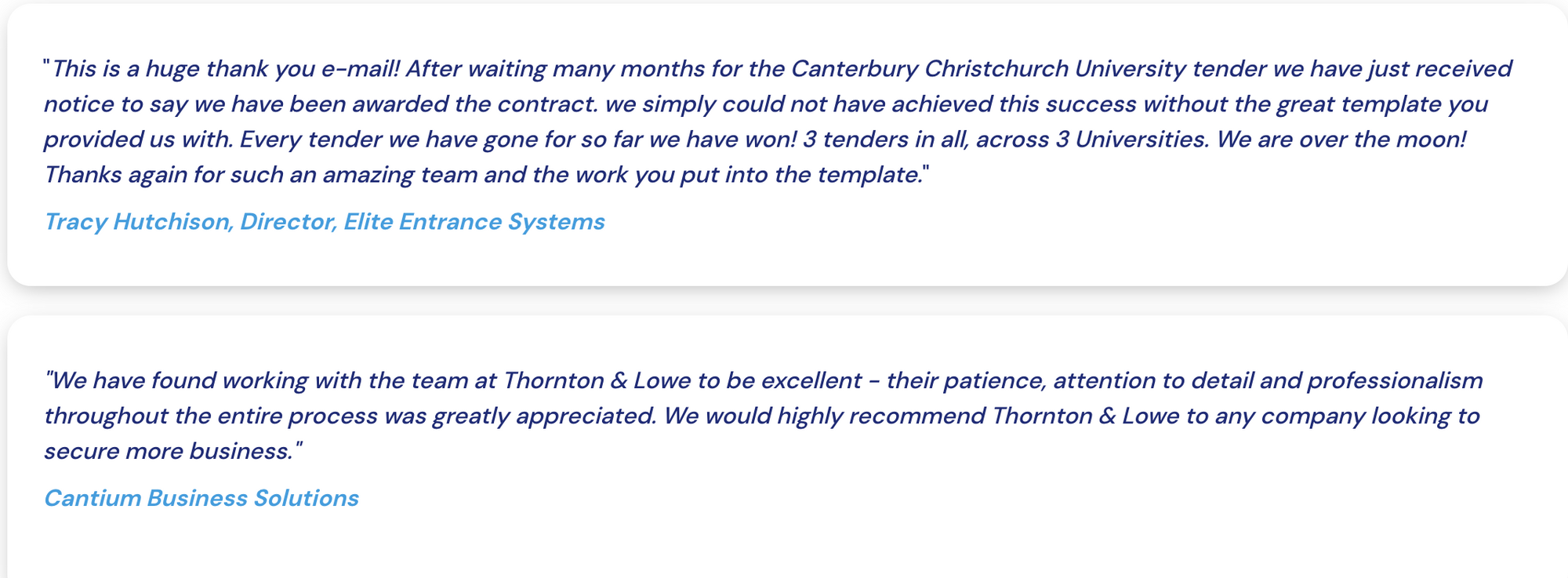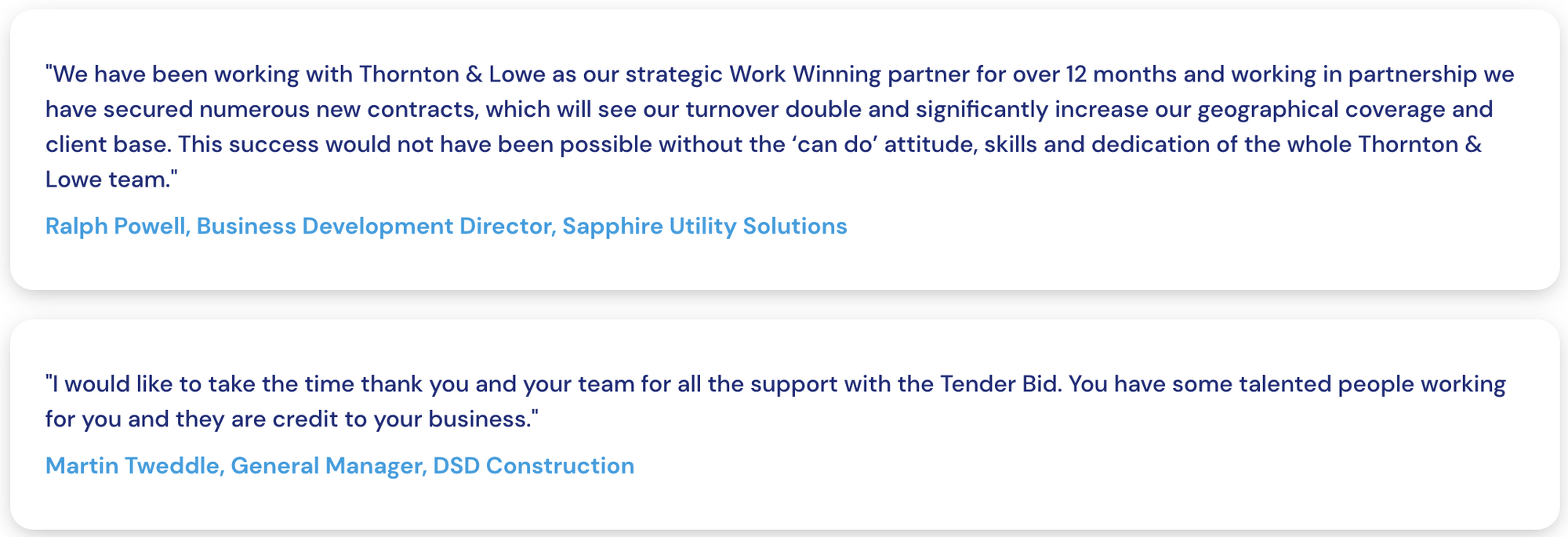With procurement increasing emphasis on bidding, the industry has developed at speed. However, this growth has brought confusion and a lack of consistency in bid titles. Specifically, the responsibilities associated with roles such as Bid Coordinators, Bid Writers and Bid Managers and Bid Consultants have become blurred.
What is a Bid Manager?
As defined by APMP, a Bid Manager is responsible for managing a bid or proposal opportunity from qualification to contract award, including:
- Early and ongoing strategy development
- Legal review
- Solution development
- Winning price development
- Partner identification
- Risk Management
- Proposal development
- Stakeholder manager
- Managing customer relationships during procurement
They are also often referred to as Bids Manager or Proposals Manager.
What does a Bid Manager do?
Bid Managers oversee the Bid Management (BM) process, taking ultimate responsibility for sourcing and delivering quality tenders on-time and within your businesses’ reasonable ability.
Demonstrating the kinds of responsibilities a Bid Manager holds, we have broken the job role down into 9 key areas:
Bid Preparation: BM begins with the preparation of bid documents and requirements. For the Bid Manager, this involves:
- Reading the Request for Proposal (RFP)/Invitation to Tender (ITT)/specification to clearly define the scope of the procurement
- Outlining technical requirements, delivery schedules, terms and conditions, evaluation criteria, and any other relevant information.
Pre-bid, the Bid Manager may also attend industry events/network with stakeholders to gain additional information and promote your solution to prospective buyers.
Bid Identification and Communication: Bid Managers recognise that is essential to proactively identify bidding opportunities that align with your capabilities and target market. They do this by keeping track of public procurement portals, such as Tender Pipeline, industry-specific platforms, and networking with procurement professionals to help discover relevant bidding opportunities.
Once identified, Bid Managers will actively communicate with the organisation issuing the bid, seek clarifications, and ensure that they have a clear understanding of the bid requirements before the tender is submitted.
Sales and marketing: Often overlooked in public procurement, Business to Government (B2G) marketing is incredibly important for suppliers looking to win public sector contracts. This is because, like with public procurement, the buyer will research suppliers during the tender process. Check out our guide for maximising your public sector sales and marketing approach and read more about why this is important.
Bid development and submission: Bid Managers will then develop a compelling bid that showcases your company’s expertise, value proposition, and competitive pricing. As a supplier, you must carefully craft your bid response, addressing each requirement and demonstrating how your offering meets the organisation's needs.
As such, attention to detail, adhering to submission guidelines, and submitting the bid within the specified timeframe are critical skills for Bid Managers to possess.
Bid evaluation: After submitting your bid, the buyer’s BM Team will evaluate all received bids. As a supplier, it is crucial for your Bid Manager to have a thorough understanding of the evaluation criteria and how your bid will be assessed. By tracking the progress of the evaluation process and actively engaging with the buyer to address any clarification requests or enquiries, Bid Managers can stay informed and improve your chances of success.
Negotiation and contract award: If your bid is shortlisted or selected, BM involves your Bid Manager engaging in negotiation discussions with the buyer. This includes discussing terms and conditions, pricing, delivery schedules, and other contractual aspects to reach mutually beneficial agreements.
Being prepared for negotiations, having a clear understanding of your value proposition, and effectively communicating your capabilities and strengths are essential during this stage.
Contract fulfilment: Your Bid Manager’s job extends beyond contract award. Once a contract is awarded, effective BM involves fulfilling the contract obligations diligently. It requires delivering the goods or services according to the agreed-upon terms, meeting quality standards, adhering to delivery schedules, and maintaining open communication with the buyer to address any issues or concerns that may arise during the contract period.
Relationship Management: Your Bid Manager will be responsible for building and maintaining a positive relationship with the buyer. This is important as developing a reputation for reliability, professionalism, and excellent service can increase your chances of future bidding success. By regularly engaging with the buyer, seeking feedback, and actively addressing their needs and concerns, your Bid Manager will be an invaluable tool to contribute to fostering a strong and enduring working partnership.
Continuous improvement: Successful BM involves a Bid Manager to continuously learn from feedback and improve your bidding strategies. As a supplier, it is important to evaluate the outcomes of your bids, analyse lessons learned, and identify areas for enhancement.
This may include refining your bid development process, improving your understanding of customer requirements, and adapting your approach based on market trends and feedback received.
Speak with a bid writing expert today
Talk to usThe Growing Importance of Bid Managers in Public Sector Procurement
With public sector procurement placing more emphasis on structured tendering, the role of a bid manager has become increasingly important. The introduction of the Procurement Act is expected to increase the use of the competitive flexible procedure, leading to more post-tender negotiations and BAFO submissions.
This shift means bid managers will need to:
- Adapt to changes in procurement procedures, as buyers introduce new evaluation methods
- Manage multiple bid revisions, ensuring submissions remain competitive throughout negotiations
- Engage with buyers earlier in the process to strengthen relationships and position their organisation effectively
For businesses bidding into the public sector, having a dedicated bid manager ensures they can respond to these evolving requirements with confidence and strategy.
Bid Manager vs. Bid Writer: Understanding the Key Differences
The terms bid manager and bid writer are sometimes used interchangeably, but they serve different functions in the bid process.
Aspect | Bid Manager | Bid Writer |
|---|---|---|
Main Role | Oversees the entire bid process, from identifying opportunities to contract award | Focuses on writing and structuring high-quality bid responses |
Key Responsibilities | Bid strategy, managing deadlines, coordinating input, reviewing final submissions | Drafting, refining, and ensuring clarity, compliance, and persuasion in responses |
Interaction with Buyers | Engages in clarifications, negotiations, and relationship-building | Supports the bid manager by ensuring content is aligned with evaluation criteria |
Decision-Making | Determines bid strategy, pricing structures, and final submissions | Works within the bid strategy to create compelling responses |
While a bid manager takes an overall strategic role, the bid writer ensures the submission is well-crafted and aligns with scoring criteria. Some organisations combine these roles, particularly smaller businesses, whereas larger firms may have separate specialists for each function.

How to Become a Successful Bid Manager
The demand for skilled bid managers is growing as organisations recognise the importance of structured tender responses. For professionals looking to build a career in bid management, developing a strong foundation in procurement and project management is key.
Key Skills for a Bid Manager
- Project management – Managing deadlines, coordinating teams, and ensuring compliance
- Commercial awareness – Understanding pricing strategies, contract risks, and financial viability
- Relationship management – Engaging with internal stakeholders and external buyers effectively
- Strong written and verbal communication – Translating technical and commercial details into clear, persuasive submissions
Qualifications and Training
- Bid writing and management training. At Thornton & Lowe our courses offer CPD points and after training over 4000 delegates are included on a lot of bid writer and manager CVs!
- Public procurement training – Understanding UK procurement regulations and frameworks
- Negotiation skills – Managing contract discussions, pricing adjustments, and post-tender clarifications
For those new to bid management, experience in bid coordination or tender writing can provide a strong starting point.
Bid Management Technology: How Software is Changing the Role
The bid management process has evolved significantly with the introduction of digital platforms, automation, and AI-driven tools. Many bid managers now rely on software to streamline bid development, improve accuracy, and increase efficiency.
Key Technologies Used in Bid Management
- Bid tracking platforms – Tools like Tender Pipeline help bid managers identify opportunities and manage deadlines
- Content libraries – Digital repositories store pre-approved responses, case studies, and pricing models to improve submission speed. Tender Library is our solution
- Collaboration software – Real-time document sharing ensures consistency and team coordination across departments
- Compliance checkers – Automated tools help verify bid requirements, reducing errors and non-compliance risks
As procurement becomes more data-driven, bid managers who use these tools effectively can improve efficiency and increase success rates.

Why More Businesses Are Outsourcing Bid Management
For many organisations, particularly SMEs, bid management is a resource-intensive process. Keeping up with evolving procurement requirements, maintaining high-quality submissions, and managing deadlines can be challenging.
Common challenges include:
- Limited in-house resources for preparing competitive tenders
- Increased competition, making high-quality responses essential
- Changing procurement rules requiring businesses to adjust their strategies frequently
Outsourcing bid management allows businesses to access:
- Experienced bid professionals who understand scoring criteria and buyer expectations
- A structured approach to improve submission quality and consistency
- Specialist support for bid reviews, BAFO negotiations, and contract discussions
For businesses struggling with capacity or consistency in bid submissions, working with external bid specialists can be a cost-effective solution.
Thornton & Lowe: Your Bid Management Partner
At Thornton & Lowe, we provide expert bid management support to businesses navigating public and private sector procurement.
We help businesses with:
- Full bid management services, from identifying opportunities to submission and post-tender negotiations
- Bid writing and quality assurance to ensure responses are clear, persuasive, and compliant
- Bid review and scoring support to strengthen submissions before they are finalised
With procurement procedures evolving, having a strong bid strategy and experienced professionals guiding the process can make all the difference. Contact us today to discuss how we can improve your bid success rates.





